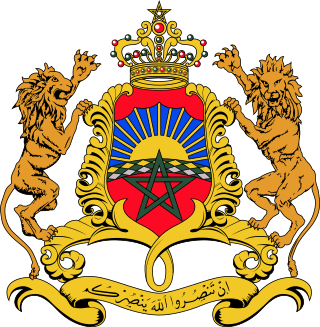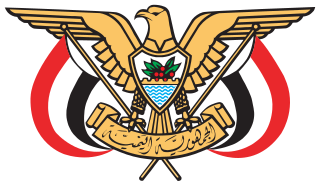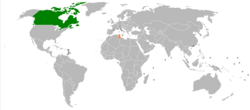
The Foreign relations of Egypt are the Egyptian government's external relations with the outside world. Egypt's foreign policy operates along a non-aligned level. Factors such as population size, historical events, military strength, diplomatic expertise and a strategic geographical position give Egypt extensive political influence in the Middle East, Africa, and within the Non-Aligned Movement as a whole. Cairo has been a crossroads of the Arab world's commerce and culture for centuries, and its intellectual and religious institutions are at the center of the region's social and cultural landmarks.

The foreign relations of Ethiopia refers to overall diplomatic relationship of Ethiopia. The Ministry of Foreign Affairs oversees foreign relations and diplomatic missions of the country.
The foreign relations of Afghanistan are in a transitional phase since the 2021 fall of Kabul to the Taliban and the collapse of the internationally-recognized Islamic Republic of Afghanistan. No country has recognised the new regime, the Islamic Emirate of Afghanistan. Although some countries have engaged in informal diplomatic contact with the Islamic Emirate, formal relations remain limited to representatives of the Islamic Republic.

The foreign relations of Ghana are controlled by the Ministry of Foreign Affairs of Ghana. Ghana is active in the United Nations and many of its specialised agencies, the World Trade Organization, the Non-Aligned Movement, the Organisation of African Unity (OAU), the African Union (AU) and the Economic Community of West African States. Ghana generally follows the consensus of the Non-aligned Movement and the OAU on economic and political issues not directly affecting its own interests. Ghana has been extremely active in international peacekeeping activities under UN auspices in Lebanon, Afghanistan, Rwanda, and the Balkans, in addition to an eight-year sub-regional initiative with its ECOWAS partners to develop and then enforce a cease-fire in Liberia. Ghana is also a member of the International Criminal Court.

Hungary wields considerable influence in Central and Eastern Europe and is a middle power in international affairs. The foreign policy of Hungary includes commitments to international development, international law, European integration, Atlantic co-operation and increased co-operation with the Eastern World. The Hungarian economy is fairly open and relies strongly on international trade.
The foreign policy of Lebanon reflects its geographic location, the composition of its population, and its reliance on commerce and trade. Until 2005, Lebanon's foreign policy had been heavily influenced by Syria, however beginning with the formation of Hezbollah in 1982, Iran had gradually grown to heavily influence Lebanon.

Morocco is a member of the United Nations and belongs to the African Union, Arab League, Arab Maghreb Union (UMA), Organisation of Islamic Cooperation (OIC), the Non-Aligned Movement and the Community of Sahel-Saharan States (CEN-SAD). Morocco's relationships vary greatly between African, Arab, United States, United Kingdom, Australia, and Western states. Morocco has had strong ties with the West in order to gain economic and political benefits. France and Spain remain the primary trade partners, as well as the primary creditors and foreign investors in Morocco. From the total foreign investments in Morocco, the European Union invests approximately 73.5%, whereas the Arab world invests only 19.3%. As of 2009, many countries from the Persian Gulf and Maghreb regions are also becoming more involved in large-scale development projects in Morocco.
Since independence, with Jaja Wachuku as the first Minister for Foreign Affairs and Commonwealth Relations, later called External Affairs, Nigerian foreign policy has been characterised by a focus on Africa as a regional power and by attachment to several fundamental principles: African unity and independence; capability to exercise hegemonic influence in the region: peaceful settlement of disputes; non-alignment and non-intentional interference in the internal affairs of other nations; and regional economic cooperation and development. In carrying out these principles, Nigeria participates in the African Union, the Economic Community of West African States (ECOWAS), the Non-Aligned Movement, the Commonwealth of Nations, and the United Nations.

Former President Zine El Abidine Ben Ali has maintained Tunisia's long-time policy of seeking good relations with the West, while playing an active role in Arab and African regional bodies. President Habib Bourguiba took a nonaligned stance but emphasized close relations with Europe, Pakistan, and the United States.

The foreign relations of Yemen are the relationships and policies that Yemen maintains with other countries. It is a member of the United Nations, the Arab League, and the Organisation of Islamic Cooperation. Yemen participates in the nonaligned movement. The Republic of Yemen accepted responsibility for all treaties and debts of its predecessors, the YAR and the PDRY. Additionally, India acceded to the Nuclear Non-Proliferation Treaty and has stressed the need to render the Middle East region free of nuclear and other weapons of mass destruction.

Since its independence from France in 1962, Algeria has pursued an activist foreign policy. In the 1960s and 1970s, Algeria was noted for its support of Third World policies and independence movements. Since its independence, Algeria has been a member of the Arab League, the African Union and of the United Nations.

The foreign relations of Canada are Canada's relations with other governments and nations. Canada is recognized as a middle power for its role in international affairs with a tendency to pursue multilateral and international solutions. Canada's foreign policy based on international peacekeeping and security is carried out through coalitions, international organizations, and the work of numerous federal institutions. The strategy of the Canadian government's foreign aid policy reflects an emphasis to meet the Sustainable Development Goals, while also providing assistance in response to foreign humanitarian crises. The Canadian Security Intelligence Service (CSIS) is tasked with gathering and analyzing intelligence to prevent threats such as terrorism, espionage, and foreign interference, while the Communications Security Establishment (CSE) is focused on cyber security and protecting Canada's digital infrastructure.

The Ministry of Foreign Affairs of the People's Republic of China is the first-ranked executive department of the State Council of the People's Republic of China, responsible for the country's foreign relations. It is led by the minister of foreign affairs, currently Wang Yi, who serves as the nation's principal representative abroad. The ministry is headquartered in Chaoyang District, Beijing, the country's primary diplomatic quarter.

Italy–Tunisia relations are foreign relations between the Italian Republic and the Republic of Tunisia. Both countries established diplomatic relations in 1957. Italy has an embassy in Tunis and 3 honorary consulates. Tunisia has an embassy in Rome, a general consulate in Palermo, 3 consulates and 2 honorary consulates.

The 1955 Austrian State Treaty ended the four-power occupation and recognized Austria as an independent and sovereign state. In October 1955, the Federal Assembly passed a constitutional law in which "Austria declares of her own free will her perpetual neutrality." The second section of this law stated that "in all future times Austria will not join any military alliances and will not permit the establishment of any foreign military bases on her territory." Since then, Austria has shaped its foreign policy on the basis of neutrality.

The State of Israel was formally established by the Israeli Declaration of Independence on 14 May 1948, and was admitted to the United Nations (UN) as a full member state on 11 May 1949. As of December 2020, it has received diplomatic recognition from 165 of the 193 total UN member states, and also maintains bilateral ties with all of the Permanent Five. 28 member states have either never recognized Israel or have withdrawn their recognition; others have severed diplomatic relations without explicitly withdrawing their recognition. Additionally, many non-recognizing countries have challenged Israel's existence—predominantly those in the Muslim world—due to significant animosity stemming from the Israeli–Palestinian conflict and the Arab–Israeli conflict.

Foreign relations of Djibouti are managed by the Djiboutian Ministry of Foreign Affairs and International Cooperation. Djibouti maintains close ties with the governments of Somalia, Ethiopia, France and the United States. It is likewise an active participant in African Union, United Nations, Non-Aligned Movement, Organisation of Islamic Cooperation and Arab League affairs.















